Blood test - everything you need to know before the test
Blood morphology is a basic blood test that evaluates the number and quality of blood cells. It can detect inflammation, anemia, and other diseases. In this article, you will learn how this test is performed, how to prepare for it, and what the results mean.
Make an appointment for a blood test:
Contents
Highlights
- A blood test is a basic diagnostic test that evaluates the number and quality of blood cells to detect various diseases, including anemia and inflammation.
- Accurate test results require appropriate preparation, including fasting for 8-12 hours before blood collection and avoiding stress and junk food.
- Regular blood tests, every 1-3 years, are extremely important for monitoring health, and their cost is low, especially within the National Health Service.
What is a blood test
Blood morphology is a basic blood test that provides a quantitative and qualitative assessment of blood cells. It analyzes red blood cells, white blood cells, and platelets to assess the patient’s overall health. The results of a complete urinalysis provide valuable information about the body’s functioning and may indicate the presence of various diseases, including blood-related diseases.
Red blood cell count provides information on the number of red blood cells, hemoglobin concentration, hematocrit, and blood cell size. These parameters are crucial for the diagnosis of anemia and other diseases related to the hematopoietic system. White blood cells, in turn, are analyzed for their number and diversity, which can indicate the presence of inflammation or infection, as well as the level of bound bilirubin.
Platelets, or platelets, are determined by their number, which is important for the diagnosis of hemorrhage and bone marrow function. Thus, blood morphology and the determination of blood cell size, blood type, cholesterol and red blood cell levels are invaluable tools for monitoring health and detecting many diseases.
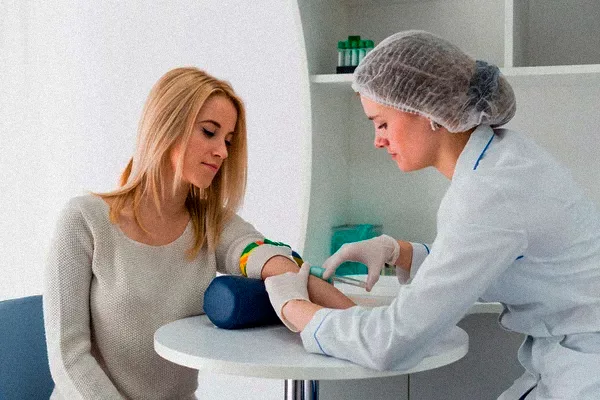
How to prepare for a blood test
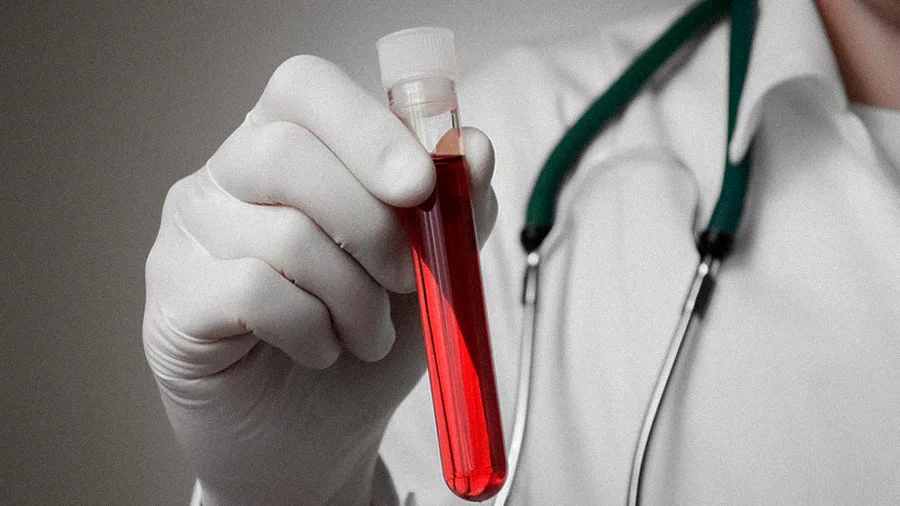
To get the most reliable blood test result, it is important to prepare for it properly. Here are some basic tips:
- Fast for 8-12 hours before the blood draw.
- The last meal should be no later than 18.00 the previous day.
- The day before the test, avoid rich and fatty foods and alcohol.
- You can drink a small amount of water on the day of the test, but you should refrain from other drinks.
Following these rules will help you get accurate test results.
Before taking the test, it is better to rest for 15 minutes to calm down your body. Insufficient sleep and eating foods with a lot of sugar the day before the test can affect the results of the blood test, so be sure to get enough sleep and avoid sweets, especially in the morning. The gdh antigen can also affect the test results.
Preparation for a blood test is crucial to ensure that the results are as accurate and reliable as possible. This will allow the doctor to properly assess the patient’s health status and recommend appropriate treatment.
Indications for blood test
Blood tests are often prescribed by doctors for diagnostic and preventive purposes. This test helps to detect anemia, inflammation, hemorrhoids, and infections. It is a key tool in the diagnosis of many diseases that may not initially produce obvious symptoms.
Blood tests can detect anemia, inflammatory diseases, leukemia, and congenital disorders. Elevated platelet counts can indicate iron deficiency anemia and chronic inflammatory diseases, including inflammation. The causes of such abnormalities as leukopenia, i.e. a reduced number of white blood cells, can be the result of the use of certain medications or viral infections, as well as the degree of anisocytosis and low water intake.
Blood tests can also detect nutrient deficiencies, such as iron deficiency, which is important for diagnosing anemia. It is a test that can save lives by detecting dangerous diseases at an early stage.
Parameters assessed by blood test
A complete blood count evaluates the number of red blood cells, white blood cells, and platelets. The results of a morphological blood test evaluate hemoglobin and hematocrit, as well as the average hemoglobin concentration. These parameters are crucial for the diagnosis of many blood diseases. CBC tests calculate such parameters as MCH (mean hemoglobin mass per red blood cell) and MCV (mean corpuscular volume), as well as blood count.
The results of blood morphology take into account different types of white blood cells, including lymphocytes, and their percentage in the total number of white blood cells. This is important for diagnosing inflammation and infections. The platelet content in the blood is determined by the PLT parameter, which measures the total number of platelets per μL of blood. Complement components are also an important element in the analysis of morphology results.
Due to the detailed analysis of these parameters, a complete blood count provides a wide range of information about the patient’s health status, which is invaluable for diagnosis and treatment monitoring.
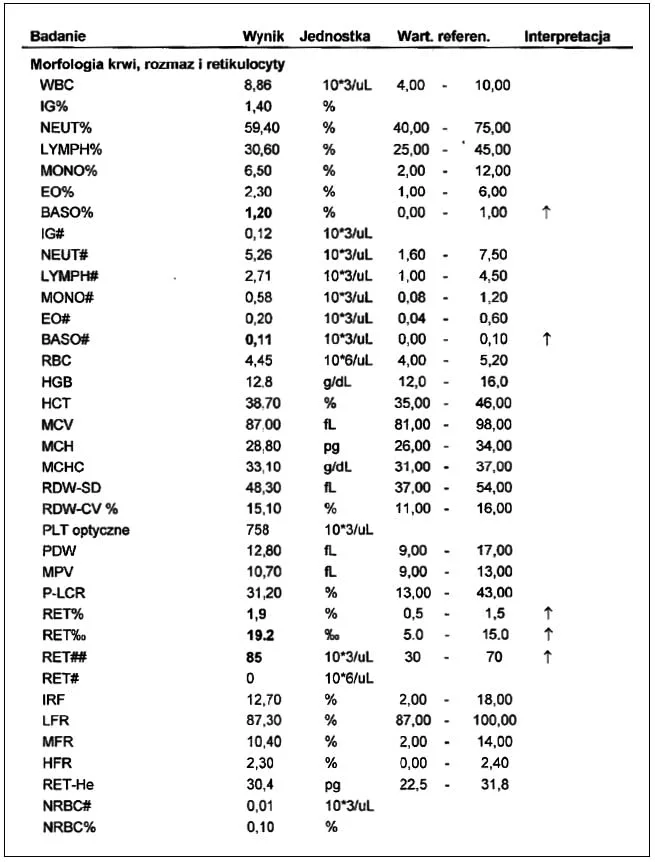
Interpretation of blood test results
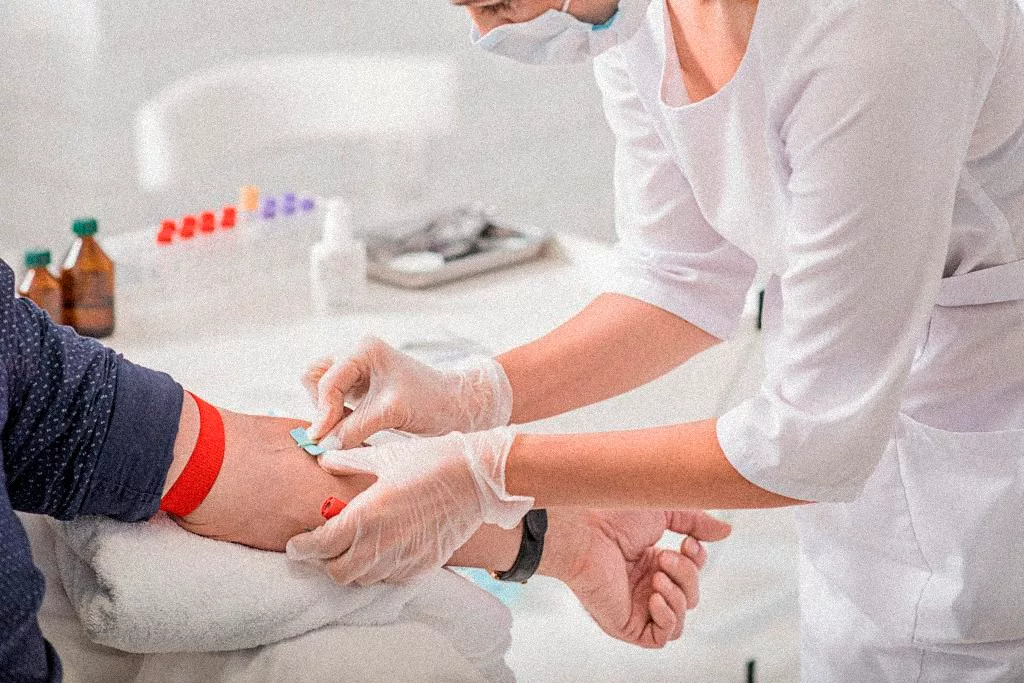
Blood test results should be interpreted by a physician who pays special attention to certain parameters related to the patient’s symptoms. Results include indicator lines, numerical values, units of measurement, and minimum and maximum normal values. The ranges of normal values may vary from laboratory to laboratory depending on the population.
Blood test results are usually given in the form of a computer printout with test symbols. Stress and menstruation can affect blood test results, so it is important to consider these factors when interpreting the results. Hematocrit values can be strongly influenced by the level of hydration.
Changes in the number of red blood cells, hemoglobin, and hematocrit are important for assessing the patient’s health status. A small change in one of the indicators with normal others often does not portend health problems, and the hemoglobin level can be a key indicator.
Frequency of blood tests
Adults should undergo a morphological examination at least once every 1-3 years. This is the minimum frequency that allows you to monitor your health and identify possible problems at an early stage.
People with chronic diseases should monitor their health more often by having regular morphological examinations. The decision on the frequency of tests should be agreed with your doctor, especially during health monitoring.
Regular basic morphological examinations and general examinations are the key to maintaining health and early detection of possible health problems.
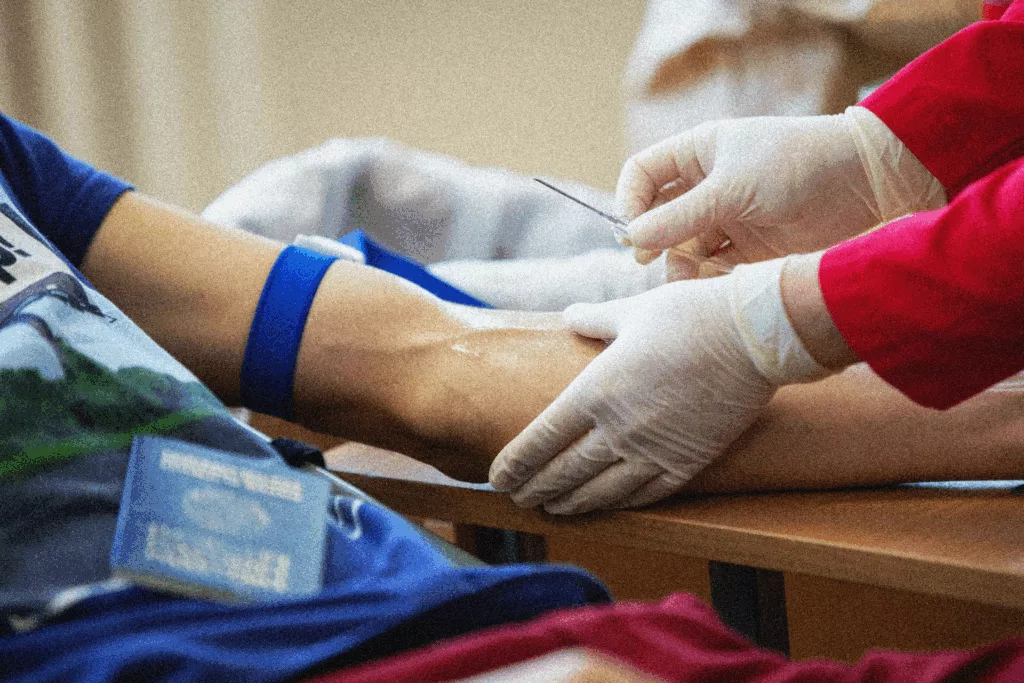
The cost of a blood test
Аналіз крові може бути проведений безоплатно по лінії Національного фонду охорони здоров’я або в приватному порядку. Вартість приватного аналізу крові становить від 9 до 13 злотих. Це відносно невисока ціна з огляду на важливість і діагностичну цінність цього аналізу.
Варто пам’ятати, що регулярний аналіз крові – це інвестиція у здоров’я, яка може запобігти серйозним захворюванням та ускладненням. У рамках Національної служби охорони здоров’я аналіз крові проводиться безкоштовно, що робить його доступним для всіх.
Blood tests can be performed free of charge by the National Health Fund or privately. The cost of a private blood test ranges from PLN 9 to 13. This is a relatively low price considering the importance and diagnostic value of this test.
It is worth remembering that regular blood tests are an investment in health that can prevent serious diseases and complications. The National Health Service provides blood tests free of charge, making them accessible to everyone.
The cost of private tests may vary depending on the laboratory and location, so it is worth checking the price list for laboratory tests at your nearest reception point.
Bottom line
A blood test is one of the most important diagnostic tests for assessing your overall health. Regularly performing this test and proper preparation for it is the key to obtaining reliable results.
We urge you to undergo regular morphological examinations, consult your doctor, and take care of your health through a healthy lifestyle and proper nutrition. Remember that health comes first!
Frequently asked questions
The main parameters assessed during a blood test are the number of red blood cells, white blood cells, platelets, hemoglobin concentration, hematocrit, and MCH and MCV values. These data provide important information about the patient’s health status.
Blood tests are indicated for the diagnosis of anemia, inflammation, infections, leukemia, and for the control of chronic diseases. It is important to have this test done regularly for effective health management.
To properly prepare for a blood test, fast for 8-12 hours, avoid fatty foods and alcohol the day before the test, and drink a small amount of water on the day of the test.
Adults should have a blood test at least once every 1-3 years, and people with chronic diseases should have it more often, as recommended by a doctor.
The National Health Service provides blood tests free of charge, while private blood tests cost from 9 to 13 zl.